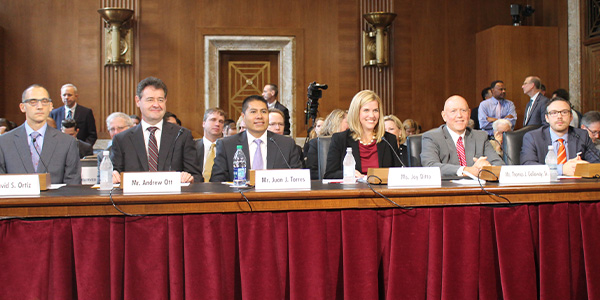By Michael Brooks
WASHINGTON — PJM CEO Andy Ott emphasized the importance of fuel diversity for grid resilience to U.S. senators Thursday, but he cautioned against government intervention in the RTO’s markets to bail out specific resources.
Appearing before a Senate Energy and Natural Resources Committee hearing on black start capability, Ott acknowledged that the question of whether the grid was becoming too dependent on natural gas was a legitimate one. But, he said, “I do want to clear up some misconceptions about black start resources. Coal and nuclear generators are generally not black start. Black start resources tend to be flexible, smaller units, like gas units or … hydro resources.”
PJM has said the announced retirements of coal and nuclear plants do not pose any short-term threat to reliability, which Ott repeated Thursday. A fuel security study, examining at what point those retirements would cause PJM to violate its reliability requirements, will be released Nov. 1, he said. (See Stakeholders Debate PJM Fuel Security Scope.)
Instead, Ott is more concerned about “a single point of failure”: Some black start resources are only gas-fired, without dual-fuel capability. In July, PJM stakeholders approved an issue charge to work on black start fuel assurance, and Ott told reporters Thursday he expects the RTO to file proposed changes with FERC early next year. (See “Manual Revisions Approved,” PJM MRC/MC Briefs: July 26, 2018.)
“The reality check is it becomes more expensive when you ask for more fuel diversity,” Ott told senators.
But, “as long as you identify the service and don’t fall into the trap of saying ‘I want a specific technology and I want to save a specific type of plant,’ then it becomes a little less expensive.”
Sen. Joe Manchin (D-W.Va.) nearly paraphrased Ott’s words later, saying he was concerned about the closures of coal plants in his state. Ott repeated that PJM has determined that the units slated for retirement would not impact reliability and pointed to its coming fuel security study.
“And so we’ll be able to say we’ve actually looked at this analytically, looked into the future,” Ott said.
Manchin responded by saying he supported President Trump’s directive to Energy Secretary Rick Perry to order RTOs and ISOs to forestall the closure of a designated list of plants for two years under the Defense Production Act of 1950.
The directive — which Trump issued in June — “makes sure that we keep the best of the best as far as coal-fired plants and nuclear plants that are up to specs and have the latest of technology in operation for at least two years until you can get through this,” Manchin said. (See Trump Orders Coal, Nuke Bailout, Citing National Security.)
“Because a lot of analytical [sic] is going on right now,” the senator continued, “and if this all comes down, and these retirements continue at an accelerated rate, I continually believe that the grid is going to be jeopardized and the security of our nation is going to be jeopardized.”
“We do have time, should we find a problem, to take action within our system,” Ott replied. “Instead of the federal government stepping in, allow us to complete our analysis.”
Ott did tell the committee that he would like to see FERC wrap up its work on its resilience docket, which it commenced in January after rejecting the Energy Department’s proposal to compensate plants with 90 days of on-site fuel.
“My desire would be for FERC to get the message that we do need their assistance, and I think any forum I can have that discussion in, I will,” he told reporters after the hearing. “We just really need to move forward.”
On Oct. 5, the Washington Examiner reported that the administration may be backing off the Defense Production Act order, as the White House has been struggling with its legal justification and received pushback from conservative organizations such as the R Street Institute and Heritage Foundation.






